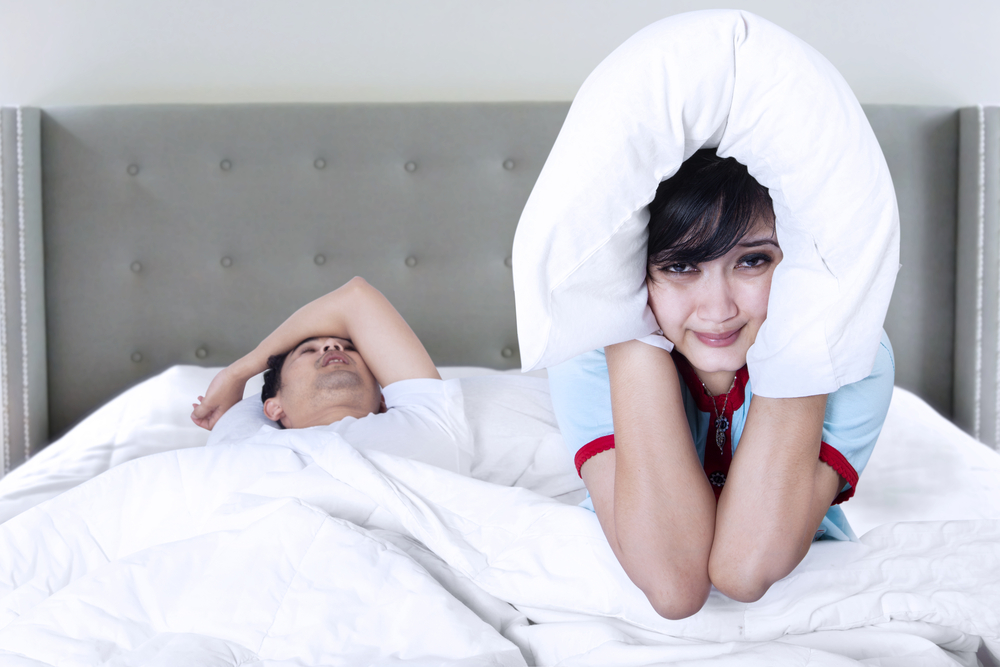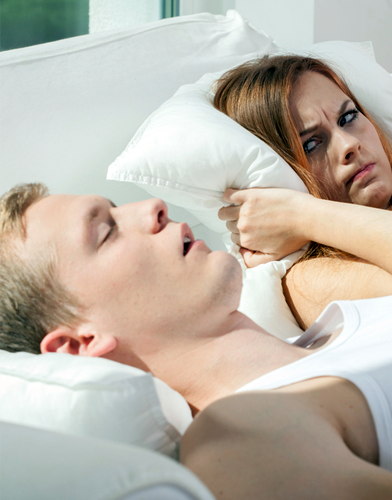
My Partner Snores, Help Me

Sleeping next to your partner shouldn’t result in cost you any sleep—that is, if your partner doesn’t sound like they’re sawing logs. Snoring has the ability to put a strain on relationships, but being supportive of your partner during this ordeal can help you both sleep and feel better in the long run. Being supportive of your partner while losing quality sleep is no easy feat, but it’s important to stay positive as their snoring may be a sign of an underlying condition—such as sleep apnea. It’s important to note that not all snorers have sleep apnea, sleep testing is required for proper identification of a sleep disorder. Everyone deserves a better nights sleep.
What Can I Do to Support My Spouse Who Snores?
Although snoring is commonly associated with sleep apnea, it’s not a telltale sign of a sleep disorder. There are people with sleep apnea who don’t snore, just as there are snorers without sleep apnea. However, snoring should be evaluated if coupled with other symptoms—such as frequent fatigue, depression or weight gain. If you feel that your spouse’s snoring could be linked to something that’s affecting their health, make sure they consult a physician. Your partner may initially be defensive—but remember, stay supportive and understanding. Listen to their reasons for being reluctant (if any) and help them see that this might be more than just a snoring problem and may potentially impact their overall health if untreated.
How can I Approach my Spouse About Sleep Testing?
Approaching your significant other about the possibility of sleep apnea isn’t always an easy conversation. Here are a few tips to keep in mind with your spouse:
- Avoid nagging.
- Be honest and open about your feelings.
- Be patient.
- Don’t be embarrassed to seek the advice of a health care professional.
 Firmly but gently insist your partner use the treatment he or she has been prescribed.
Firmly but gently insist your partner use the treatment he or she has been prescribed.- Make a recording so you can show your partner the seriousness of the problem.
- Make temporary arrangements to sleep separately, if needed.
- Offer encouragement and support while your partner is adjusting.
- Remind your partner that a good night’s sleep for both of you will lead to a less stressful relationship.
- Try not to take it personally that your partner has a medical condition. This is something that’s out of their control.
- Use positive feedback to help support your spouse.
- If your partner’s snoring persists and sleep studies have concluded they do not have sleep apnea, there are still some things you can do to achieve better sleep. If there is no underlying medical condition causing their snoring, coping with the noise may be the realistic solution. Some solutions include:
- Quality earplugs to minimize the noise.
- Playing white noise or nature sounds can help drown out some snoring.
- Noise-cancelling headphones cover the mastoid bone, which makes them more effective for blocking out sound and their vibrations.
- While not ideal, sleeping in separate bedrooms may be appropriate if no other solution works.
What Can I Do to Help Make My Partner’s Sleep Apnea More Manageable?
If your partner undergoes a sleep study and is diagnosed with sleep apnea, your support is necessary for ensuring their consistent treatment. Hold them accountable by ensuring they always sleep with their prescribed CPAP device, as well as performing other activities that contribute to healthy sleep. Regular exercise and a healthy diet are two of the most important aspects of consistently healthy sleep, so make sure they’re staying active! Taking part in these healthy activities with your partner turns them from a series of chores into couples activities that ultimately blend in seamlessly with the rest of the time you spend together. Avoid late night eating, alcohol, caffeine and smoking as these can disrupt healthy sleep. Keep your bedroom quiet, dark, and comfortable and don’t forget to shut off the electronics at least an hour before bed.
If you have trouble sleeping with your partner’s CPAP machine in the room, you can ask for a longer cord to be attached to the machine so that it can be stored in a closet, around a corner or another area where its noise becomes less intrusive. You can also try adding a white noise machine to the bedroom or wearing earplugs. Snoring and sleep apnea don’t just affect those that have the sleep disorder, but their spouses as well. If your spouse is showing signs of a sleep disorder, consult a physician right away. They may see fit that a sleep study be conducted—so ask about home sleep testing if they do. Home sleep testing with Home Sleep Delivered is more comfortable and convenient than in-lab tests, at nearly 10 percent the price, too!




